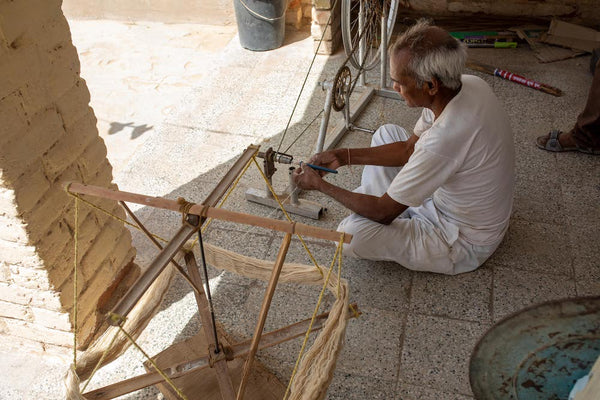
The modest wooden charkha was the inspiration for our work with handloom weavers in Rajasthan. 1987 witnessed the worst drought of the century. The farmers of the URMUL Dairy which funded our work in the URMUL Trust, lost most of their cows, and income from milk. At the URMUL Trust, where we had begun work just a year ago in maternal and child health, we went around talking to women about other options to combat drought and found that many of them had charkhas and knew how to spin woolen yarn. We purchased wool from Bikaner mandi – the largest such in Asia and distributed them in villages where we worked.

Women queued up to get this wool, so that could they spin it and then deposit the yarn next week, getting the much-needed cash to buy essentials. With all the wool piling up, we looked for
weavers and found them from the neighboring district of Jodhpur...they wove the handspun yarn, and taught the craft of handloom weaving to the women and men in the villages of Bikaner. Soon we started working in villages where refugees who came from Pakistan during the 1971 war, were resettled.The women could embroider intricate beautiful designs on fabric, and they too became part of the URMUL network.

At rangSutra we treasure our beginnings – the years of social mobilization and organization– and build on this to create a social enterprise that seeks to empower all people across the chain, one that creates value and benefits all, thus ensuring sustainable livelihoods for our artisan shareholders. We take action to fulfill practical needs of our artisans – like ensuring regular work through design development and procuring orders – we take special care to pay attention to strategic initiatives like skills upgradation, and teaching new skills to artisans, in design, management, quality control and marketing. This way they can play the different roles needed in the successful running of a grassroots social enterprise, that seeks to take its offerings to the world. We hope that our village craft production centres across Western Rajasthan, reflect in a small way, Gandhiji’s vision of creating self sufficient vibrant village communities, so that people do not have to migrate in search of work to cities and towns, unless they really want to.
Today, rangSutra stands as a company owned by over 2000 artisans, united by a shared commitment to create clothing that embodies both beauty and ethical integrity, in harmony with the principles that Gandhiji championed.
